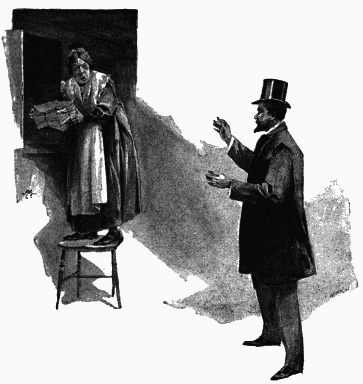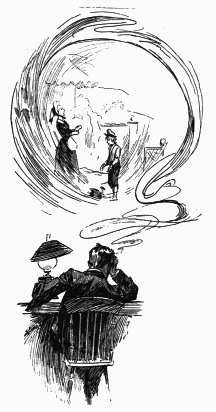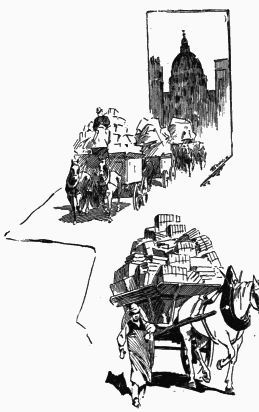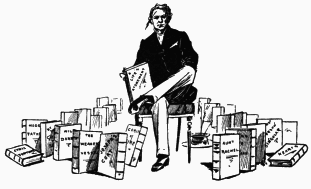
The enthusiasm with which I had begun the work had long since had time to pall, and the whole thing looked weary, flat, stale, and unprofitable. For one thing, I had adopted the abominable expedient of writing in the present tense so far as the autobiographical portion of the work was concerned, and, in the interval which had gone by, my taste had, I suppose, undergone an unconscious correction. It was a dull business, but, despondent as I was, I found the heart to rewrite those chapters. Charles Reade describes the task of writing out one's work a second time as 'nauseous,' and I confess that I am with him with all my heart. It is a misery which I have never since, in all my work, imposed upon myself. At that time I counted amongst my friends an eminent novelist, on whose critical faculty and honesty I knew I could place the most absolute reliance. I submitted my revised first volume to his judgment, and was surprised to learn that he thought highly of it. His judgment gave me new courage, and I sent the copy in to Chambers.

After a delay of a week or two, I received a letter which gave me, I think, a keener delight than has ever touched me at the receipt of any other communication. 'If,' wrote Robert Chambers,'the rest is as good as the first volume, I shall accept the book with pleasure. Our price for the serial use will be 250l., of which we will pay 100l. on receipt of completed MS.; the remaining 150l. will be paid on the publication of the first monthly number.' I had been out of harness for so long a time, and had been, by desultory work, able to earn so little, that this letter seemed to open a sort of Eldorado to my gaze. It was not that alone which made it so agreeable to receive. It opened the way to an honourable ambition which I had long nourished, and I slaved away at the remaining two volumes with an enthusiasm which I have never been able to revive. There are two or three people still extant who know in part the privations I endured whilst the book was being finished. I set everything else on one side for it, incautiously enough, and for two months I did not earn a penny by other means. The most trying accident of all the time was the tobacco famine which set in towards the close of the third volume, but, in spite of all obstacles, the book was finished. I worked all night at the final chapter, and wrote 'Finis' somewhere about five o'clock on a summer morning. I shall never forget the solemn exultation with which I laid down my pen and looked from the window of the little room in which I had been working over the golden splendour of the gorse-covered common of Ditton Marsh.

All my original enthusiasm had revived, and in the course of my lonely labours had grown to a white heat. I solemnly believed at that moment that I had written a great book. I suppose I may make that confession now without proclaiming myself a fool. I really and seriously believed that the work I had just finished was original in conception, style, and character. No reviewer ever taunted me with the fact, but the truth is that 'A Life's Atonement' is a very curious instance of unconscious plagiarism. It is quite evident to my mind now that if there had been no 'David Copperfield' there would have been no 'Life's Atonement.' My Gascoigne is Steerforth, my John Campbell is David, John's aunt is Miss Betsy Trotwood, Sally Troman is Peggotty. The very separation of the friends, though brought about by a different cause, is a reminiscence. I was utterly unconscious of these facts, and, remembering how devotedly and honestly I worked, how resolute I was to put my best of observation and invention into the story, I have ever since felt chary of entertaining a charge of plagiarism against anybody. There are, of course, flagrant and obvious cases, but I believe that in nine instances out of ten the supposed criminal has worked as I did, having so completely absorbed and digested in childhood the work of an admired master that he has come to feel that work as an actual portion of himself. 'A Life's Atonement' ran its course through Chambers's Journal in due time, and was received with favour. Messrs. Griffith & Farran undertook its publication in book form, but one or two accidental circumstances forbade it to prosper in their hands. To begin with, the firm at that time had only newly decided on publishing novels at all, and a work under such a title, and issued by such a house, was naturally supposed to have a theological tendency. Then again, in the very week in which my book saw the light, 'Lothair' appeared, and for the time being swamped everything. All the world read 'Lothair,' all the world talked about it, and all the newspapers and reviews dealt with it, to the exclusion of the products of the smaller fry. Later on, 'A Life's Atonement' was handsomely reviewed, and was indeed, as I am disposed to think, praised a good deal beyond its merits. But it lay a dead weight on the hands of its original publishers, until Messrs. Chatto & Windus expressed a wish to incorporate it in their Piccadilly Series. The negotiations between the two houses were easily completed, the stock was transferred from one establishment to the other, the volumes were stripped of their old binding and dressed anew, and with this novel impetus the story reached a second edition in three-volume form. It brought me almost immediately two commissions, and by the time that they were completed I had grown into a professional novel-writer.

'A ROMANCE OF TWO WORLDS'
By Marie Corelli
IT is an unromantic thing for an author to have had no literary vicissitudes. One cannot expect to be considered interesting, unless one has come up to London with the proverbial solitary 'shilling,' and gone about hungry and footsore, begging from one hard-hearted publisher's house to another with one's perpetually rejected manuscript under one's arm. One ought to have consumed the 'midnight oil;' to have 'coined one's heart's blood' (to borrow the tragic expression of a contemporary gentleman-novelist); to have sacrificed one's self-respect by metaphorically crawling on all-fours to the critical faculty; and to have become ?sthetically cadaverous and blear-eyed through the action of inspired dyspepsia. Now, I am obliged to confess that I have done none of these things, which, to quote the Prayer-book, I ought to have done. I have had no difficulty in making my career or winning my public. And I attribute my good fortune to the simple fact that I have always tried to write straight from my own heart to the hearts of others, regardless of opinions and indifferent to results. My object in writing has never been, and never will be, to concoct a mere story which shall bring me in a certain amount of cash or notoriety, but solely because I wish to say something which, be it ill or well said, is the candid and independent expression of a thought which I will have uttered at all risks.
In this spirit I wrote my first book, 'A Romance of Two Worlds,' now in its seventh edition. It was the simply worded narration of a singular psychical experience, and included certain theories on religion which I, personally speaking, accept and believe. I had no sort of literary pride in my work whatsoever; there was nothing of self in the wish I had, that my ideas, such as they were, should reach the public, for I had no particular need of money, and certainly no hankering after fame. When the book was written I doubted whether it would ever find a publisher, though I determined to try and launch it if possible. My notion was to offer it to Arrowsmith as a shilling railway volume, under the title 'Lifted Up.' But in the interim, as a kind of test of its merit or demerit, I sent the MS. to Mr. George Bentley, head of the long-established and famous Bentley publishing firm. It ran the gauntlet of his 'readers' first, and they all advised its summary rejection. Among these 'readers' at that time was Mr. Hall Caine. His strictures on my work were peculiarly bitter, though, strange to relate, he afterwards forgot the nature of his own report. For, on being introduced to me at a ball given by Miss Eastlake, when my name was made and my success assured, he blandly remarked, before a select circle of interested auditors, that he 'had had the pleasure of recommending' my first book to Mr. Bentley! Comment on this were needless and unkind: he tells stories so admirably that I readily excuse him for his 'slip of memory,' and accept the whole incident as a delightful example of his inventive faculty.